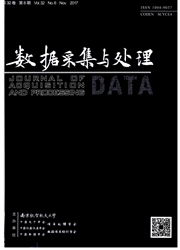

 中文摘要:
中文摘要:
为研究低信噪比条件下阵列信号处理中的波达角(Directionofarrival,DOA)估计问题,分析了低信噪比条件下信号子空间和噪声子空间的特征值表现,探讨了随机观测对子空间特征值的影响。提出了在低信噪比条件下对接收信号先进行子空间分离,后进行随机观测的降维处理方法,并将稀疏贝叶斯学习应用到DOA中,降低了DOA估计的复杂度,同时保证估计的精度。仿真实验表明,本算法在低信噪比条件下性能良好,对非相干源和相干源均有良好的估计性能。
 英文摘要:
英文摘要:
To study the direction of arrival (DOA) problem in array signal processing with low signal-to-noise ratio (SNR) scene, the eigenvalue performance of signal subspace and noise subspace eigenvalues is analyzed, and the influence of random observation on subspace eigen- values is investigated. Under the condition of low SNR, the method of subspace separate is firstly proposed, followed by random observation; And the sparse Bayesian leaning (SBL)- based reconstruction method is applied to DOA, which reduces the computational complexity of DOA estimation while keeping the reconstruction precision. Simulation results show that the proposed algorithm performs well under low SNR condition for signals with and without any coherence.
 同期刊论文项目
同期刊论文项目
 同项目期刊论文
同项目期刊论文
 pattern synthesis for opportunistic array radar using least square fitness estimation-genetic algori
pattern synthesis for opportunistic array radar using least square fitness estimation-genetic algori Noncircular-PARAFAC for 2D-DOA estimation of noncircular signals in arbitrarily spaced acoustic vect
Noncircular-PARAFAC for 2D-DOA estimation of noncircular signals in arbitrarily spaced acoustic vect 期刊信息
期刊信息
